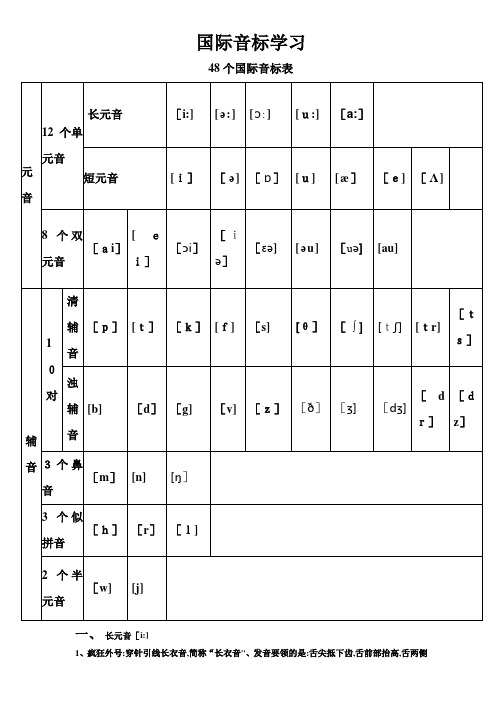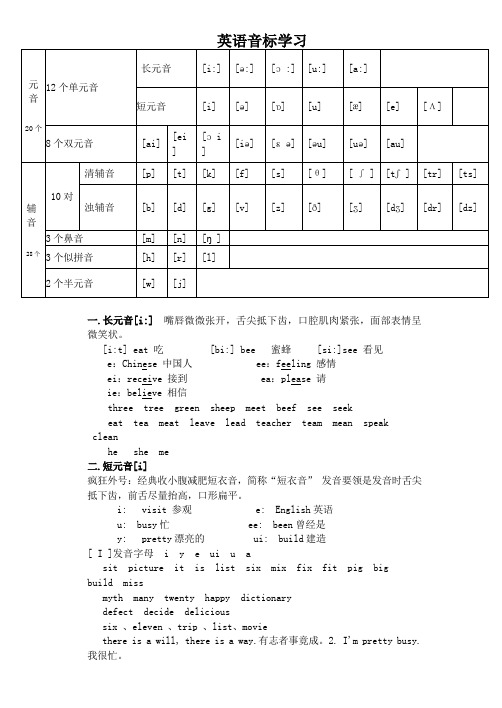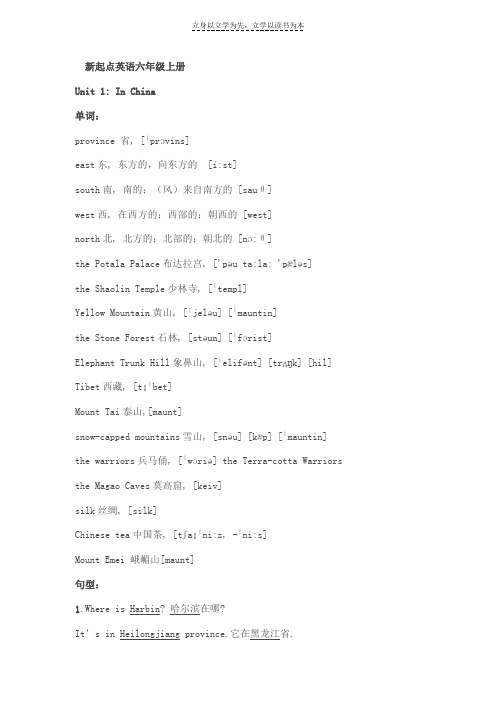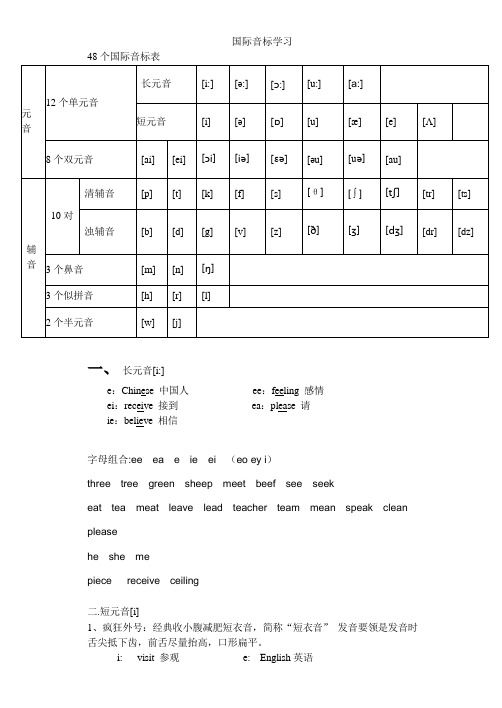英标和句型
48个国际音标表及发音要领

48个国际音标表注:辅音部分中斜体音标为清辅音,读清辅音时声带不振动。
与其相邻的音标即为浊辅音,读浊辅音时声带要振动。
48个音标发音要领1.前元音/i:/ 疯狂外号:穿针引线长衣音,简称“长衣音”.发音要领:舌尖抵下齿,舌前部抬高,舌两侧抵上齿两侧,口形偏平。
实用操练1.Speaking English is a piece of cake.说英语是小菜一碟2.Seeing is believing.眼见为实。
额外奉献:这是一个非常好用的句型:Please feel free to ...(请尽管.../请随时...)Please feel free to visit anytime.请尽管随时采访。
2.前元音/i/ 疯狂外号:经典收小腹减肥短衣音,简称“短衣音”。
发音要领:发音时舌尖抵下齿,前舌尽量抬高、舌位高于/i:/口形扁平。
实用操练:1.Where there is a will, there is a way.有志者事竟成。
2. I'm pretty busy.我很忙。
3. 前元音/e / 疯狂外号:“小开口45度”音,简称为“45度”音。
发音时舌尖抵下齿,舌前部稍抬起,舌位比/i:/低;唇形中常,开口度比/i:/大。
实用操练:1. Better late than never. 迟到总比不到好2. East or west, home is best. 金窝银窝,不如自己的狗窝。
4.前元音/æ/ 疯狂外号:“大开口夸张90度音”。
简称“90度大嘴音”。
发音时舌尖抵下齿;舌前部稍抬高,舌位比/e/更低;双唇成扁平形。
实用操练:1.I have a happy family. 我有个幸福的家庭。
2.Not bad.不错。
5. 中元音/ʌ/ 疯狂外号:“经典收小腹减肥急促短啊音。
”简称“短啊音”。
发音时舌尖和舌端两侧轻触下齿,舌后部稍抬起,唇形稍扁,开口较大。
实用操练:1. It doesn't matter. 不重要。
最新48个国际音标表(打印版)已整理

48个国际音标表12元音12个单元音长元音[i:][][][u:][a:]短元音[i][][][u][][e][] 8个双元音[ai][ei][i][i][][][u][au]辅音10对清辅音[p][t][k][f][s][][ ∫ ][][tr][ts]浊辅音[b][d][g][v][z][][ ][][dr][dz] 3个鼻音[m][n][]3个似拼音[h][r][l]2个半元音[w][j]3一.前元音 /i:/疯狂外号:穿针引线长衣音,简称“长衣音”.发音要领的是:4舌尖抵下齿,舌前部抬高,舌两侧抵上齿两侧,口形偏平。
5e:Chin e se 中国人6ee:feel 感觉 b ee蜜蜂 s ee看见71ei:rec ei ve 接到89ie:bel ie ve 相信10ea:pl ea se 请 s ea t 座位 t ea cher 教师 sp ea k 讲11实用操练1.Speaking English is a piece of cake.说英语是小菜一碟122.Seeing is bel ie ving.眼见为实。
13额外奉献:这是一个非常好用的句型:Please feel free to ...(请尽管.../请随时...)1415Please feel free to visit anytime.请尽管随时采访。
16二.前元音美语音标/i/疯狂外号:经典收小腹减肥短衣音,简称“短衣音”发1718音要领是发音时舌尖抵下齿,前舌尽量抬高、舌位高于/i/:口形扁平。
19i: visit 参观 s i t 坐20e: E nglish英语21ee: been曾经是22u: b u sy忙y: prett y漂亮的2324ui: b ui ld建造25实用操练:1.Where there is a will, there is a way.有志者事竟成。
2. I'm pretty busy.我很忙。
48个国际音标表(A4打印版)

国际音标学习48个国际音标表一、长元音[i:]1、疯狂外号:穿针引线长衣音,简称“长衣音"、发音要领的是:舌尖抵下齿,舌前部抬高,舌两侧抵上齿两侧,口形偏平。
e:Chinese 中国人ee:feeling感情ei:receive 接到ea:please请ie:believe相信2、词汇拓展:we、she 、meet 、sixteen、each 、please3、实用操练:(1)Speaking Englishisapieceof cake、讲英语是小菜一碟(2)Seeingisbelieving、眼见为实、4、额外奉献:Please feelfree to 、、、(请尽管、、、/请随时、、、)这是一个特不行用的句型。
(1)Pleasefeelfree to visitanytime、请尽管随时采访。
(2)Please feel free to ask for any helpanytime、需要帮忙尽管讲二、短元音[i]1、疯狂外号:经典收小腹减肥短衣音,简称“短衣音”发音要领是发音时舌尖抵下齿,前舌尽量抬高,口形扁平。
i: visit 参观e:English英语u:busy忙ee: been曾经是y:pretty美丽的ui:build建造2、词汇拓展:six 、eleven 、trip 、list、movie3、实用操练:1、Wherethere isa will, there is a way、有志者事竟成、2、I'mprettybusy、我特不忙。
三、元音[e]1、疯狂外号:“小开口45度”音,简称为“45度"音。
发音时舌尖抵下齿,舌前部稍抬起,舌位比[i:]低;唇形中常,开口度比[i:]大、e:remember记得question问题ea:weather天气, pleasant 令人愉快的2、词汇拓展:pen、yes、bed、let、every、egg3、实用操练:(1)Better late thannever、迟到总比不到好(2)East orwest, homeisbest、金窝银窝,不如自己的狗窝、(3)、Let's get together when theweather is better、等天气好一点我们再相聚。
英语48个国际音标的总结

一.长元音[i:] 嘴唇微微张开,舌尖抵下齿,口腔肌肉紧张,面部表情呈微笑状。
[i:t] eat 吃 [bi:] bee 蜜蜂 [si:]see 看见e:Chinese 中国人 ee:feeling 感情ei:receive 接到 ea:please 请ie:believe 相信three tree green sheep meet beef see seekeat tea meat leave lead teacher team mean speak cleanhe she me二.短元音[i]疯狂外号:经典收小腹减肥短衣音,简称“短衣音”发音要领是发音时舌尖抵下齿,前舌尽量抬高,口形扁平。
i: visit 参观 e: English英语u: busy忙 ee: been曾经是y: pretty漂亮的 ui: build建造[ I ]发音字母 i y e ui u asit picture it is list six mix fix fit pig big build missmyth many twenty happy dictionarydefect decide delicioussix 、eleven 、trip 、list、moviethere is a will, there is a way.有志者事竟成。
2. I'm pretty busy.我很忙。
三.元音[e]疯狂外号:“小开口45度”音,简称为“45度”音。
发音时舌尖抵下齿,舌前部稍抬起,舌位比[i:]低;唇形中常,开口度比[i:]大。
e: remember记得 question 问题ea:weather天气, pleasant 令人愉快的[e] 字母组合 ea e a (ue,u,ie,ai,ei,ay)head bread pleasureelephant electric remember sell shell lesson better beddesk hotel yes many any pen yes bed let every egg(1)Better late than never. 迟到总比不到好(2)East or west, home is best. 金窝银窝,不如自己的狗窝。
新起点英语六年级上册单词带音标 句型

新起点英语六年级上册Unit 1: In China单词:province 省, [ˈprɔvins]east东, 东方的,向东方的 [i:st]south南, 南的;(风)来自南方的 [sauθ]west西,在西方的;西部的;朝西的 [west]north北,北方的;北部的;朝北的 [nɔ:θ]the Potala Palace布达拉宫, ['pəu ta:la: 'pæləs]the Shaolin Temple少林寺, [ˈtempl]Yellow Mountain黄山, [ˈjeləu] [ˈmauntin]the Stone Forest石林, [stəun][ˈfɔrist]Elephant Trunk Hill象鼻山, [ˈelifənt][trʌŋk][hil] Tibet西藏, [tɪˈbet]Mount Tai泰山,[maunt]snow-capped mountains雪山, [snəu][kæp] [ˈmauntin] the warriors兵马俑, [ˈwɔriə]the Terra-cotta Warriors the Magao Caves莫高窟, [keiv]silk丝绸, [silk]Chinese tea中国茶, [tʃaɪˈni:z, -ˈni:s]Mount Emei 峨嵋山[maunt]句型:1.Where is Harbin? 哈尔滨在哪?It’s in Heilongjiang province.它在黑龙江省.It’s in the north of China.它在中国北部.2.What’s Tibet famous for? 西藏因什么而著名?It’s famous for the Potala Palace.它因布达拉宫而著名. Unit 2: Around the World:单词:continent洲,[ˈkɔntinənt]Asia亚洲, [ˈeɪʃə]Europe欧洲, [ˈjʊərəp]Africa非洲, [ˈæfrikə]North America北美洲,South America南美洲,Oceania大洋洲, [ˌəʊʃi:ˈæni:ə]Russia俄罗斯, [ˈrʌʃə]Egypt埃及, [ˈi:dʒɪpt]Spain西班牙, [speɪn]the United States美国,[ju:ˈnaɪtɪd] [steit]Thailand泰国,[ˈtailænd]Canada加拿大,[ˈkænədə]Japan日本,[dʒəˈpæn]France法国,[fræns]Britain英国,[ˈbrɪtn]Australia澳大利亚, [ɔ:ˈstreɪljə]Japanese日语, [ˌdʒæpəˈni:z, -ˈni:s]Chinese汉语, [tʃaɪˈni:z, -ˈni:s]French法语, [frentʃ]Russian俄语, [ˈrʌʃən]pyramid金字塔, [ˈpirəmid]kangaroo袋鼠[ˌkæŋgəˈru:]句型:1.Where would you like to go this winter vacation?今年寒假你想去哪? I’d like to go to Barcelona.我想去Barcelona.2.What do you know about France?关于法国,你知道什么?It’s in Europe.它在欧洲.What language do people speak there?那里的人们说什么语言?They speak French..他们说法语.Unit 3:Animal World:单词:reptile爬行动物, [ˈreptail]mammal哺乳动物, [ˈmæməl]insect昆虫, [ˈinsekt]crocodile鳄鱼, [ˈkrɔkədail]ostrich鸵鸟,[ˈɔstrɪtʃ, ˈɔ:s-]penguin企鹅, [ˈpeŋɡwin]whale鲸, [hweil]shark鲨, [ʃɑ:k]hippo河马, [ˈhipəu]zebra斑马, [ˈzi:brə]lion狮子, [ˈlaiən]butterfly蝴蝶, [ˈbʌtəflai]hummingbird蜂鸟, [ˈhʌmɪŋˌbɜ:d]centimeter厘米, [ˈsentimi:tər]giraffe长颈鹿, [dʒəˈræf]meter米, [ˈmi:tə]kilometer千米, [ˈkiləˌmi:tə]strong强壮的, [strɒŋ]wing翅膀, [wiŋ]ton吨, [tʌn]heavy重的.[ˈhevi]句型:1.What kind of animal are monkeys? 猴子是哪一类动物?They’re mammals.它们是哺乳动物.2. How tall is it?它有多高?It’s 1.5 meters tall.它有1.5米高.3. It is as small as a thumb.它象大拇指一样小.Unit 5: Feelings单词:surprised惊讶的, [səˈpraɪzd]angry生气的, [ˈæŋɡri]happy快乐的, [ˈhæpi]worried忧愁的, [ˈwʌrɪd]sad伤心的, [sæd]excited兴奋的, [ɪkˈsaɪtɪd]nervous紧张的, [ˈnə:vəs]proud骄傲的[praud]句型:1.I am surprised.我很惊讶.2.You look worried. 你看起来很忧愁.3.Why? 为什么?I am worried because my dog is sick.我忧愁是因为我的狗病了. Unit 6:Famous People单词:artist画家, [ˈɑ:tist]actor演员, [ˈæktə]musician音乐家, [mju:ˈziʃən]writer作家, [ˈraitə]scientist科学家, [ˈsaiəntist]inventor发明家, [ɪnˈventə]Chinese中国人, [tʃaɪˈni:z, -ˈni:s]German德国人, [ˈdʒɜ:mən]Danish丹麦人, [ˈdeiniʃ]English英格兰人, [ˈɪŋglɪʃ]American美国人, [əˈmerɪkən]composed写,创作(乐曲), [kəmˈpəʊzd]national anthem国歌, [ˈnæʃənəl] [ˈænθəm]invent发明, [inˈvent]Peking operas京剧, [ˈɔpərə]shrimp虾, [ʃrimp]story故事[ˈstɔ:ri]句型:1.This is Thomas Edison.这是托马斯.爱迪生.2.He was an inventor.他是一位发明家.3.He was American.. 他是美国人.4.He was born in 1847 .他出生在1847年.5.Why is he famous?他为什么著名?He is famous because he invented the light bulb.他著名是因为他发明了灯泡.Unit 7: Future单词:astronaut宇航员, [ˈæstrənɔ:t]detective侦探, [diˈtektiv]professor教授, [prəˈfesə]president(学院的)院长, [ˈprezidənt]principal(中小学校的)校长, [ˈprinsəpəl]moon月亮, [mu:n]sun太阳, [sʌn]ocean海洋, [ˈəuʃən]cloud云彩, [klaud]future将来,[ˈfju:tʃə]robot机器人, [ˈrəubɔt]housework家务劳动, [ˈhauswə:k]pollution污染,[pəˈluʃən]pill药片, [pil]peace和平, [pi:s]Mars火星, [mɑ:z]spaceship宇宙飞船, [ˈspeɪsˌʃɪp]earth地球, [ə:θ]war战争[wɔ:]句型:1.What will you be in the future?将来你要当什么?I will be a detective.我要当个侦探.2.Where will you live in the future?将来你居住在哪里?I will live on ars.我住在火星上.3.What will the future be like?将来会是什么样?There will be more cars.会有更多的小汽车.People will eat pills as meals.人们将吃药片作为正餐.。
48个国际音标表(打印版)已整理

国际音标学习48个国际音标表1i:visit参观e:English英语u:busy忙ee:been曾经是y:pretty漂亮的ui:build建造2、词汇拓展:six、eleven、trip、list、movie3、实用操练:1.Wherethereisawill,thereisaway.有志者事竟成。
2.I'mprettybusy.我很忙。
三.元音[e]1、疯狂外号:“小开口45度”音,简称为“45度”音。
发音时舌尖抵下齿,舌前部稍抬起,舌位比[i:]低;唇形中常,开口度比[i:]大。
e:rememberea:23(1(2(3四.?1a:practice23(1)Ihaveahappyfamily.我有个幸福的家庭。
(2)Notbad.不错。
(3)Asamatteroffact,Ithinkheisoutstanding.事实上,我认为他很杰出。
五.音标[?:]1、疯狂外号:"重读卷舌音"发音时舌中部比发/e/音时略高。
双唇扁平。
er:prefer更喜欢ir:dirty脏的ere:were是(be)or:world世界ur:hurt伤害urgent紧急的2、词汇拓展:her、first、shirt、thirty、learn3、实际操练:(1(2六.1er::ocean 海洋a:alonee:23(1(2(3)Forgetaboutit.算了吧。
(4)Allowmetointroducemyself.请容许我介绍一下我自己。
七.音标[a:]1、疯狂外号:“感叹祖国大好山河音”发音时口张大,舌身压低并后缩,后舌稍隆起,舌尖不抵下齿,双唇稍收圆。
a:watch观看ear:heart心ar:far远的smart聪明的uar:guard保卫2、词汇拓展:card、father、star、farm、half3、实际操练:(1)Ittakesalotofhardwork.这需要很多的辛勤劳动。
48个国际音标表(打印版)已整理92782

国际音标学习48个国际音标表1、疯狂外号:穿针引线长衣音,简称“长衣音”.发音要领的是:舌尖抵下齿,舌前部抬高,舌两侧抵上齿两侧,口形偏平。
e:Chinese 中国人ee:feeling 感情ei:receive 接到ea:please 请ie:believe 相信2、词汇拓展:we、she 、meet 、sixteen 、each 、please3、实用操练:(1)Speaking English is a piece of cake. 说英语是小菜一碟(2)Seeing is believing. 眼见为实。
4、额外奉献:Please feel free to ...(请尽管.../请随时...)这是一个非常好用的句型。
(1)Please feel free to visit anytime.请尽管随时采访。
(2)Please feel free to ask for any help anytime.需要帮忙尽管说二.短元音[i]1、疯狂外号:经典收小腹减肥短衣音,简称“短衣音”发音要领是发音时舌尖抵下齿,前舌尽量抬高,口形扁平。
i: visit 参观e: English英语u: busy忙ee: been曾经是y: pretty漂亮的ui: build建造2、词汇拓展:six 、eleven 、trip 、list、movie3、实用操练:1.Where there is a will, there is a way.有志者事竟成。
2. I'm pretty busy.我很忙。
三.元音[e]1、疯狂外号:“小开口45度”音,简称为“45度”音。
发音时舌尖抵下齿,舌前部稍抬起,舌位比[i:]低;唇形中常,开口度比[i:]大。
e:remember记得question 问题ea:weather天气,pleasant 令人愉快的2、词汇拓展:pen、yes、bed、let、every、egg3、实用操练:(1)Better late than never. 迟到总比不到好(2)East or west, home is best. 金窝银窝,不如自己的狗窝。
48个国际音标表(打印版) 很全很经典

国际音标学习一、长元音[i:]e:Chinese 中国人ee:feeling 感情ei:receive 接到ea:please 请ie:believe 相信字母组合:ee ea e ie ei (eo ey i)three tree green sheep meet beef see seekeat tea meat leave lead teacher team mean speak clean pleasehe she mepiece receive ceiling二.短元音[i]1、疯狂外号:经典收小腹减肥短衣音,简称“短衣音”发音要领是发音时舌尖抵下齿,前舌尽量抬高,口形扁平。
i: visit 参观e: English英语u: busy忙ee: been曾经是y: pretty漂亮的ui: build建造[ I ]发音字母i y e ui u asit picture it is list six mix fix fit pig big build missmyth many twenty happy dictionarydefect decide delicious2、词汇拓展:six 、eleven 、trip 、list、movie3、实用操练:1.Where there is a will, there is a way.有志者事竟成。
2. I'm pretty busy.我很忙。
三.元音[e]1、疯狂外号:“小开口45度”音,简称为“45度”音。
发音时舌尖抵下齿,舌前部稍抬起,舌位比[i:]低;唇形中常,开口度比[i:]大。
e:remember记得question 问题ea:weather天气,pleasant 令人愉快的[e] 字母组合ea e a (ue,u,ie,ai,ei,ay)head bread pleasureelephant electric remember sell shell lesson better beddesk hotel yesmany any2、词汇拓展:pen、yes、bed、let、every、egg3、实用操练:(1)Better late than never. 迟到总比不到好(2)East or west, home is best. 金窝银窝,不如自己的狗窝。
- 1、下载文档前请自行甄别文档内容的完整性,平台不提供额外的编辑、内容补充、找答案等附加服务。
- 2、"仅部分预览"的文档,不可在线预览部分如存在完整性等问题,可反馈申请退款(可完整预览的文档不适用该条件!)。
- 3、如文档侵犯您的权益,请联系客服反馈,我们会尽快为您处理(人工客服工作时间:9:00-18:30)。
元音单元音前元音[iː][ɪ][e][æ] 中元音 [ɜː][ə][ʌ] 后元音[uː][ʊ][ɔː][ɒ][ɑː]双元音开合双元音[eɪ][aɪ][ɔɪ][aʊ][əʊ]集中双元音[ɪə][eə][ʊə] 辅音 爆破音 清辅音 [p][t][k] 浊辅音 [b][d][ɡ] 摩擦音 清辅音 [f][s][ʃ][θ][h]浊辅音 [v][z][ʒ][ð] 破擦音 清辅音 [tʃ][tr][ts] 浊辅音 [dʒ][dr][dz] 鼻音 (浊辅音) [m][n][ŋ] 舌则音 (浊辅音) [l][r] 半元音 (浊辅音) [j][w]
/ɪ/:bid /ʊ/:good /e/:bed(/ɛ/) /ʌ/:bud /æ/:bat(/a/) /ɒ/:pot /iː/:bead /uː/:booed /ɜː/:bird(/əː/) /ɔː/:bought, board /ɑː/:father, bard
/eɪ/:bay /ɔɪ/:boy /əʊ/:toe /aɪ/:buy(/ʌɪ/) /aʊ/:cow
/p/:pit /b/:bit /t/:tin /d/:din /k/:cut /ɡ/:gut /ts/:its /dz/goods /tʃ/:cheap /dʒ/:jeep /m/:map /n/:nap /ŋ/:bang /f/:fat /v/:vat /θ/:thin /ð/:then /s/:sap /z/:zap /ʃ/:she /ʒ/:measure /h/:ham /w/:we /r/:run /j/:yes /l/:left
英语中的五种基本句型结构 一、句型1: Subject (主语) + Verb (谓语) 这种句型中的动词大多是不及物动词,所谓不及物动词,就是这种动词后不可以直接接 宾语。常见的动词如:work, sing, swim, fish, jump, arrive, come, die, disappear, cry, happen 等。如: 1) Li Ming works very hard.李明学习很努力。 2) The accident happened yesterday afternoon.事故是昨天下午发生的。 二、句型2:Subject (主语) + Link. V(系动词) + Predicate(表语) 这种句型主要用来表示主语的特点、身份等。其系动词一般可分为下列两类: (1)表示状态。这样的词有:be, look, seem, smell, taste, sound, keep等。如: 1) This kind of food tastes delicious.这种食物吃起来很可口。 2) He looked worried just now.刚才他看上去有些焦急。 (2)表示变化。这类系动词有:become, turn, get, grow, go等。如: 1) Spring comes. It is getting warmer and warmer.春天到了,天气变得越来越暖和。 2) The tree has grown much taller than before.这棵树比以前长得高多了。 三、句型3:Subject(主语) + Verb (谓语) + Object (宾语) 这种句型中的动词一般为及物动词, 所谓及物动词,就是这种动词后可以直接接宾语,其宾语通常由名词、代词、动词不定式、动名词或从句等来充当。例: 1) He took his bag and left.(名词) 他拿着书包离开了。 2) Li Lei always helps me when I have difficulties. (代词)当我遇到困难时,李雷总能给我帮助。 3) She plans to travel in the coming May Day.(不定式)她打算在即将到来的“五一”外出旅游。 4) I don’t know what I should do next. (从句)我不知道下一步该干什么。 注意:英语中的许多动词既是及物动词,又是不及物动词。 四、句型4: Subject(主语)+Verb(谓语)+ Indirect object(间接宾语)+Direct object (直接宾语) 这种句型中,直接宾语为主要宾语,表示动作是对谁做的或为谁做的,在句中不可或缺,常常由表示“物”的名词来充当;间接宾语也被称之为第二宾语,去掉之后,对整个句子的影响不大,多由指“人”的名词或代词承担。引导这类双宾语的常见动词有:buy, pass, lend, give, tell, teach, show, bring, send等。如: 1) Her father bought her a dictionary as a birthday present.她爸爸给她买了一本词典作为生日礼物。 2)The old man always tells the children stories about the heroes in the Long March. 老人经常给孩子们讲述长征途中那些英雄的故事。 上述句子还可以表达为: 五、句型5: Subject(主语)+Verb (动词)+Object (宾语)+Complement(补语) 这种句型中的“宾语 + 补语”统称为“复合宾语”。宾语补足语的主要作用或者是补充、说明宾语的特点、身份等;或者表示让宾语去完成的动作等。担任补语的常常是名词、形容词、副词、介词短语、分词、动词不定式等。如: 1)You should keep the room clean and tidy. 你应该让屋子保持干净整洁。(形容词) 2) We made him our monitor.(名词)我们选他当班长。 3) His father told him not to play in the street.(不定式)他父亲告诉他不要在街上玩。 4)My father likes to watch the boys playing basketball.(现在分词) 5) Yesterday I had a picture taken with two Americans.(过去分词) ● 常见的动词有: tell, ask, advise, help, want, would like, order, force, allow等。 ● 注意:动词have, make, let, see, hear, notice, feel, watch等后面所接的动词不定式作宾补时,不带to。如: 1) The boss made him do the work all day.老板让他整天做那项工作。 1 what [hwɔt] pron 什么 2 is [iz] v 是 3 what's [hwɔts] what is 的缩写形式 4 your [juə] pron 你的,你们的 5 name [neim] n 名字 6 my [mai] pron 我的 7 I [ai] pron 我 8 am [æm] v 是 9 I'm [aim] I am 的缩写形式 10 in [in] prep 在...里(内,上) 11 row [rəu] n (一)排,(一)行 12 one [wʌn] num 一 13 number ['nʌmbə] n 数字,号码 14 two [tu:] num 二 15 too [tu:] adv 也 16 three [θri:] num 三 17 are [ɑ:] v 是 18 you [ju:] pron 你,你们 19 yes [jes] adv 是 20 four [fɔ:] num 四 21 five [faiv] num 五 22 no [nəu] adv & adj 不,不是 23 not [nɔt] adv 不 24 hi [hai] int 喂(问候或唤起注意) 25 class [klɑ:s] n (学校里的)班级,年级 26grade[greid 年级 27 six [siks] num 六 28 seven ['sevn] num 七 29 eight [eit] num 八 30 nine [nain] num 九 31 ten [ten] num 十 32 zero ['ziərəu] num & n 零 33 plus [plʌs] prep 加,加上 34 it [it] pron 它 35 It's [its] it is 的缩写形式 36 how [hau] adv (指程度)多少,怎样 37 old [əuld] adj ...岁的,老的 38 eleven [i'levn] num 十一 39 twelve [twelv] num 十二 40 minus ['mainəs] prep减,减去 41 thirteen ['θə:ti:n] num 十三 42fourteen ['fɔ:'ti:n] num 十四 43 fifteen ['fif'ti:n] num 十五 44 hello [hə'ləu] int喂 45 please[pli:z] int请 46 can [kæn] v.aux 能,可以会 47 spell[spel] v 拼写 48 that [ðæt] pron 那,那个 49 secret ['si:krit] n 秘密 50 this [ðis] pron 这,这个
